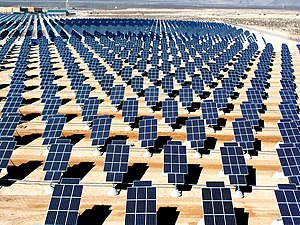Yes – Now Solar is Affordable!
You probably already know that installing solar panels is one of the best ways to make your home more energy efficient and environmentally friendly, but did you also know that you could wind up saving money in the process?

English: On 140 acres of unused land on Nellis Air Force Base, Nev., 70,000 solar panels are part of a solar photovoltaic array that will generate 15 megawatts of solar power for the base. (Photo credit: Wikipedia)
The fact that solar can save homeowners money is driving increased interest on the part of consumers. Here are some surprising Facts on Who Goes Solar? According to the Solar Energy Industries Association, the U.S. residential solar market grew nearly 62% (see chart) last year and isn’t expected to slow down any in 2013.
Are You ready to go solar at your home or business? Perhaps you didn’t know that the typical solar customer is changing, too. While solar panel buyers ten years ago focused on environmental benefits, today’s solar consumer is looking at other factors. Many homeowners today are buying solar for the same reason they’re buying hybrids: It saves money, and the choice to go with solar powered electricity these days just makes sense.
If you’ve been paying electrical bills for more than a handful of years, you are already well aware of the fact that those bills continue to increase every year and usually consume a large chunk of your monthly expenses.
The cost of solar panels has declined dramatically in recent years. According to Rhone Resch, president and chief executive of the Solar Energy Industries Association, the prices of solar panels decreased 60% last year, making it a more affordable option for many homeowners to consider.
Federal tax credits for solar installations have helped,too. Solar systems installed from Jan. 1, 2009 to Dec. 31, 2016 can get a tax credit of 30% off the cost. State and local incentives can even further reduce the cost of installing solar panels.
When calculating the cost of solar panels, homeowners should consider how much they’ll save on utility bills. Beware of solar installers though, that are overly aggressive in estimating how much you’ll save. Remember, any projection of utility bill savings is an estimate at best; it’s impossible to know how electric rates will fluctuate or how your home energy usage will change.
It’s unclear whether low solar panel prices are here to stay, but one thing is certain: There’s never been a better time to go solar. Now’s the right time to act on this current information. You can feel good about looking into your options for going solar and saving green.
About the Author: Ryan McNeill is president of Renewable Energy Corporation, which helps homeowners make the transition to solar power homes.



















